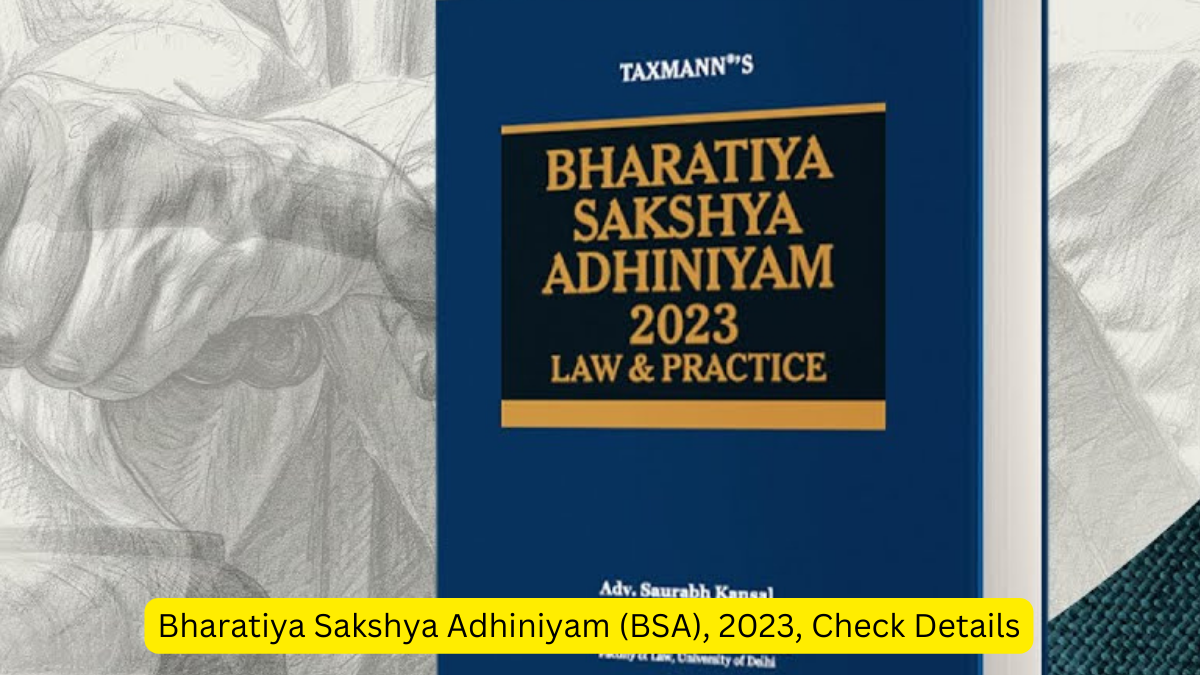नए आपराधिक कानून, भारतीय न्याय संहिता (BNS), भारतीय नागरिक सुरक्षा संहिता (BNSS) और भारतीय सक्षम अधिनियम (BSA) 1 जुलाई, 2024 से प्रभावी हो रहे हैं। ये कानून क्रमशः भारतीय दंड संहिता, दंड प्रक्रिया संहिता और इंडियन एविडेंस एक्ट (Indian Evidence Act) को निरस्त और प्रतिस्थापित करते हैं।
नया कानून पारित
नया कानून पिछले दिसंबर में संसद द्वारा पारित किया गया था, जिसमें गृहमंत्री अमित शाह ने, जिन्होंने इस परिवर्तन का नेतृत्व किया था, कहा कि यह कानून न्याय प्रदान करने को प्राथमिकता देगा, ब्रिटिश काल के कानूनों के विपरीत जो दंडात्मक कार्रवाई को प्राथमिकता देते थे। उन्होंने कहा, “ये कानून भारतीयों द्वारा, भारतीयों के लिए और भारतीय संसद द्वारा बनाए गए हैं और औपनिवेशिक आपराधिक न्याय कानूनों के अंत का प्रतीक हैं।”
भारतीय साक्ष्य अधिनियम के बारे में
भारतीय साक्ष्य अधिनियम (BSA) इंडियन एविडेंस एक्ट को बदलकर साक्ष्य की प्रक्रिया में परिवर्तन लाता है। BSA “इलेक्ट्रॉनिक और डिजिटल रिकॉर्ड” की अनुमति देता है। इसमें ईमेल, सर्वर लॉग्स, कंप्यूटर, लैपटॉप या स्मार्टफोन पर संग्रहित फ़ाइलें, वेबसाइट सामग्री, स्थान डेटा और टेक्स्ट मैसेज जैसे विभिन्न इलेक्ट्रॉनिक रिकॉर्ड्स शामिल होते हैं। BSA मौखिक साक्ष्य को इलेक्ट्रॉनिक रूप से लेने की भी अनुमति देता है। इसके अतिरिक्त, बलात्कार के अपराध संबंधी जांच में पीड़ित को अधिक सुरक्षा प्रदान करने और पारदर्शिता को बढ़ाने के लिए, पीड़ित का बयान ऑडियो-वीडियो माध्यम से रिकॉर्ड किया जाएगा।
विस्तारित द्वितीयक साक्ष्य
भारतीय साक्ष्य अधिनियम (BSA) ने “द्वितीयक साक्ष्य” को विस्तारित करके मौखिक और लिखित स्वीकृतियाँ भी शामिल किया है। इसमें कहा गया है कि द्वितीयक साक्ष्य में “एक व्यक्ति की साक्ष्य होगी जिसने एक ऐसे दस्तावेज़ की जांच की है, जिसकी मूल प्रतिलिपि में अनेक खातों या अन्य दस्तावेज़ होते हैं जिन्हें अदालत में सुविधाजनक रूप से जांच नहीं किया जा सकता, और जो ऐसे दस्तावेज़ की जांच में निपुण हैं।”
पुराने कानून और नए कानून के बीच अंतर
| Aspect | Old Law (Indian Evidence Act, 1872) | New Law (Bhartiya Sakshya Adhiniyam, 2023) |
|---|---|---|
| Introduction Date | 1872 | 2023 |
| Colonial Influence | Drafted during British colonial rule | Drafted to reflect post-independence and modern Indian values |
| Language and Terminology | Archaic English | Simplified and modernized language |
| Structure | Structured with 167 sections | Revised structure, includes new sections |
| Admissibility of Evidence | Detailed rules on admissibility | Updated rules considering technological advancements |
| Electronic Evidence | Basic recognition in amendments | Comprehensive provisions for electronic and digital evidence |
| Hearsay Rule | Strict adherence to hearsay rule | Modified to accommodate modern communication methods |
| Witness Testimony | Traditional procedures | Enhanced procedures including video conferencing for testimony |
| Relevance of Evidence | Defined under Sections 5-55 | Expanded to include modern types of evidence |
| Documentary Evidence | Sections 61-90 | Updated to include electronic documents |
| Presumption | Various presumptions detailed | New presumptions reflecting modern societal norms |
| Confessions | Sections 24-30 cover confessions | Revised provisions on confessions, especially digital confessions |
| Privileged Communication | Detailed in Sections 122-132 | Expanded to cover modern professional communications |
| Expert Testimony | Sections 45-51 | Broadened scope to include digital forensic experts |
| Burden of Proof | Sections 101-114 cover burden of proof | Updated rules considering new types of evidence |
| Character Evidence | Sections 52-55 | Revised to reflect current societal values |
| Presumption of Innocence | Strongly upheld | Continued emphasis with additional safeguards |
| Alibi | Specific provisions | More detailed provisions on proving alibi |
| Sexual Offenses Evidence | Limited recognition of victims’ rights | Enhanced protections and considerations for victims |
| Corroboration | Requirement for corroboration in certain cases | Updated requirements, especially in cases of digital evidence |
| Chain of Custody | Basic principles | Detailed procedures for maintaining chain of custody for digital evidence |
| In-camera Proceedings | Limited provisions | Expanded scope for in-camera proceedings, especially in sensitive cases |
| Forensic Evidence | Basic inclusion | Extensive provisions for forensic evidence, including DNA |
| Hostile Witnesses | Provisions for dealing with hostile witnesses | Updated rules considering the impact of digital threats |
| Adverse Inference | Sections on adverse inference from silence or non-production of evidence | Updated to reflect modern legal standards |
| Reforms Focus | Admissibility and relevance primarily | Emphasis on efficiency, technology, and victim rights |




 Holi 2026: जानें इस बार कब होगा होलिका द...
Holi 2026: जानें इस बार कब होगा होलिका द...
 हरियाणा में पीएम श्री मॉडल पर ‘सीएम श्री...
हरियाणा में पीएम श्री मॉडल पर ‘सीएम श्री...
 भारत और नेपाल ने वन एवं वन्यजीव सहयोग बढ...
भारत और नेपाल ने वन एवं वन्यजीव सहयोग बढ...








